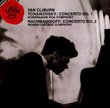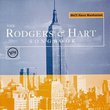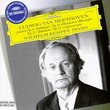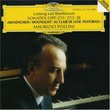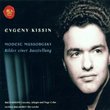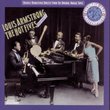| All Artists: Wolfgang Amadeus Mozart, Christopher Hogwood, Emma Kirkby, Anthony Rolfe Johnson, The Academy of Ancient Music, Westminster Cathedral Choir, Carolyn Watkinson, David Thomas Title: Mozart - Requiem / Kirkby · Watkinson · Rolfe Johnson · D. Thomas · AAM · Hogwood Members Wishing: 0 Total Copies: 0 Label: Decca Release Date: 10/25/1990 Genre: Classical Styles: Opera & Classical Vocal, Historical Periods, Classical (c.1770-1830), Early Music Number of Discs: 1 SwapaCD Credits: 1 UPC: 028941171221 |
Search - Wolfgang Amadeus Mozart, Christopher Hogwood, Emma Kirkby :: Mozart - Requiem / Kirkby · Watkinson · Rolfe Johnson · D. Thomas · AAM · Hogwood
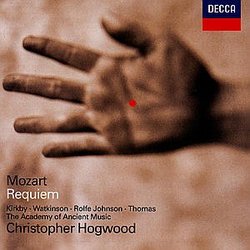 | Wolfgang Amadeus Mozart, Christopher Hogwood, Emma Kirkby Mozart - Requiem / Kirkby · Watkinson · Rolfe Johnson · D. Thomas · AAM · Hogwood Genre: Classical
|
Larger Image |
CD DetailsSimilar CDsSimilarly Requested CDs |
CD ReviewsThe best I've heard Jonathan J. Casey | the twin cities | 08/18/2000 (5 out of 5 stars) "I'm going to slyly avoid the arguments about the different versions of Mozart's Requiem mass, because the most important thing to me is the quality of the performance: and Hogwood's is the best. While I enjoyed listening to William Christie's recording, and Herreweghe's disc excels in the trumpets and drums department (very crisp), what really stands above on this recording is Emma Kirkby's perfect solo voice. When her voice first rings out, it is the most pure and beautiful I can imagine. Not Figueras on Savall's rendition, nor the soloists for Christie, Herreweghe, and Gardiner, are her equal. Kirkby avoids the trappings of vibrato and other inappropriate colorations, and simply shines through. The AAM plays very well and the boys chorus brings a haunting, gorgeous touch to the Confutatis. This is a recording that should last through the ages as a classic, I hope. We are fortunate that it is still available!" A great recording of a lesser-known arrangement of this work 09/11/1998 (5 out of 5 stars) "This is a superb recording, featuring some of the best voices in choral music today. Because Mozart died before he finished the Requiem, there are several versions of the finished piece arranged by students or colleagues of Mozart after his death. This is the only recording I have been able to find of the Maunder version of the Requiem. The more popular version of the Requiem is arranged by Sussmayer, a student of Mozart's, and it's often hard to find anything different. This is a beautiful, moving piece of music and I would highly recommend this recording." Superb and Haunting justin meyer | Stanford, CA | 02/03/2001 (5 out of 5 stars) "This recording of the famous Death Mass embodies all that Mozart himself would have wanted, powerful raw emotion and celestial reflection. My personal tastes in choral singing includes the traditional all-male chorale, and the effects of such beautiful nuance from mixed choirs make the recording particularly personal. For one, the purity of male trebles in the Requiem offer precise articulation in the fugue sections of Kyrie and Lux Aeterna that in other recordings blur because of the female vibrato. The clarity given to these lines add an element of beauty to the horrific tones instead of just the "elephant trampling" effect of other recordings (I know this because I own 9 different recordings of Requiem, including those that are supposedly 5 star). Another strength of the all-male chorale is the way that transition into more quiet and seductive melodies within larger, fearful movements happens with great ease and haunting effect (the treble melodies of "salve me" and "voca me" are angelically beautiful and perfect). As to other gems of this incredible recording, the interpretation of each movement seems to be just right and viable in producing the specific affectations in the listener. The use of timpani is moderate and effective in bringing out a certain "rawness" in sections like Kyrie and Dies Irae. One of my favorite moments is at the end of the Kyrie and the Lux Aerterna sections. The last chord of these sections is sung as an open fifth amoung the voices, leaving an incredibly profound ambiguity as to the nature of the end of both the piece and of life(this being a death mass) as to whether resolution from the minor key has taken place . The soprano soloist mimics the celestial beauty in the upper register of the boy trebles and brings superb relfection in the solo sections of the first and last movements. The accompaniment moves the recording accurately as a "sea of sound," rising and crashing at the crests and calming as if it were another "organ" of this organism of a recording, acting in conjunction with the chorale but also as its own entity. The blend of everything is superb, the soloists are gorgeous each in their own right, the chorale performs wonderfully, and the selected versions of the Requiem fit perfectly together as what Mozart would have wanted. I am an avid collector of choral music, I have sung in choirs since I was 5, I know the Requiem backwards and forwards, and no other Mozart Requiem recording gives me as much satisfaction."
|

 Track Listings (13) - Disc #1
Track Listings (13) - Disc #1
